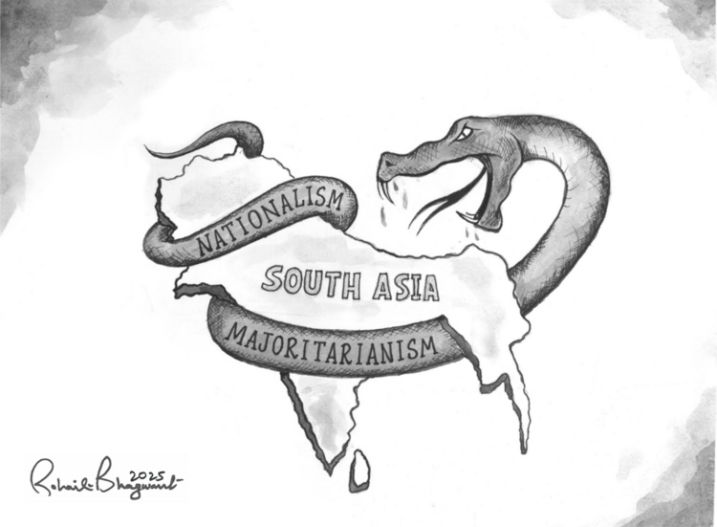South Asia Program
Trump to Impose Sweeping New Tariffs on Much of the World

Eswar Prasad, SAP
Eswar Prasad, professor of trade policy, calls the latest move “a dark day in the annals of global trade integration, which was once seen as having so much promise in bringing countries together around a vision of shared prosperity.”
Additional Information
Information Session: Global Internships

December 3, 2025
4:30 pm
Uris Hall, G02
Go global in summer 2026! Global Internships give you valuable international work experience in fields spanning global development, climate and sustainability, international relations, communication, business, governance, and more.
Applications are open now.
Can’t attend? Contact programs@einaudi.cornell.edu.
***
The Mario Einaudi Center for International Studies hosts info sessions for graduate and for undergraduate students to learn more about funding opportunities, international travel, research, and internships. View the full calendar of fall semester sessions.
Additional Information
Program
Einaudi Center for International Studies
Reppy Institute for Peace and Conflict Studies
East Asia Program
Southeast Asia Program
Latin American and Caribbean Studies
Institute for African Development
Institute for European Studies
South Asia Program
Migrations Program
Southwest Asia and North Africa Program
Information Session: Global Internships

November 13, 2025
4:30 pm
Uris Hall, G08
Go global in summer 2026! Global Internships give you valuable international work experience in fields spanning global development, climate and sustainability, international relations, communication, business, governance, and more.
Applications are open now.
Can’t attend? Contact programs@einaudi.cornell.edu.
***
The Mario Einaudi Center for International Studies hosts info sessions for graduate and for undergraduate students to learn more about funding opportunities, international travel, research, and internships. View the full calendar of fall semester sessions.
Additional Information
Program
Einaudi Center for International Studies
Reppy Institute for Peace and Conflict Studies
East Asia Program
Southeast Asia Program
Latin American and Caribbean Studies
Institute for African Development
Institute for European Studies
South Asia Program
Migrations Program
Southwest Asia and North Africa Program
Information Session: Global Internships

October 23, 2025
4:30 pm
Uris Hall, G08
Go global in summer 2026! Global Internships give you valuable international work experience in fields spanning global development, climate and sustainability, international relations, communication, business, governance, and more.
Applications are open now.
Can’t attend? Contact programs@einaudi.cornell.edu.
***
The Mario Einaudi Center for International Studies hosts info sessions for graduate and for undergraduate students to learn more about funding opportunities, international travel, research, and internships. View the full calendar of fall semester sessions.
Additional Information
Program
Einaudi Center for International Studies
Reppy Institute for Peace and Conflict Studies
East Asia Program
Southeast Asia Program
Latin American and Caribbean Studies
Institute for African Development
Institute for European Studies
South Asia Program
Migrations Program
Southwest Asia and North Africa Program
Information Session: Global Internships

October 2, 2025
4:30 pm
Uris Hall, G08
Go global in summer 2026! Global Internships give you valuable international work experience in fields spanning global development, climate and sustainability, international relations, communication, business, governance, and more.
Applications will open in the fall.
Can’t attend? Contact programs@einaudi.cornell.edu.
***
The Mario Einaudi Center for International Studies hosts info sessions for graduate and for undergraduate students to learn more about funding opportunities, international travel, research, and internships. View the full calendar of fall semester sessions.
Additional Information
Program
Einaudi Center for International Studies
Reppy Institute for Peace and Conflict Studies
East Asia Program
Southeast Asia Program
Latin American and Caribbean Studies
Institute for African Development
Institute for European Studies
South Asia Program
Migrations Program
Information Session: Graduate Student Opportunities at the Einaudi Center

September 18, 2025
4:30 pm
Uris Hall, G08
Join us to learn about opportunities for graduate students with the Einaudi Center for International Studies. This session will discuss how to discover or strengthen global interests, including research and travel grants, guest lectures, fellowships, and more!
Can't attend? Email programs@einaudi.cornell.edu for more information.
Additional Information
Program
Einaudi Center for International Studies
Reppy Institute for Peace and Conflict Studies
East Asia Program
Southeast Asia Program
Latin American and Caribbean Studies
Institute for European Studies
South Asia Program
Migrations Program
Institute for African Development
Southwest Asia and North Africa Program
Information Session: Undergraduate Opportunities at the Einaudi Center

September 9, 2025
4:30 pm
Uris Hall, G08
Join us to learn about opportunities for undergraduate students with the Einaudi Center for International Studies. This session will discuss how to discover or strengthen global interests, including academic minors, guest lectures, summer research and travel experiences, and more!
Can't attend? Email programs@einaudi.cornell.edu for more information.
Additional Information
Program
Einaudi Center for International Studies
Reppy Institute for Peace and Conflict Studies
East Asia Program
Southeast Asia Program
Latin American and Caribbean Studies
Institute for European Studies
South Asia Program
Migrations Program
Institute for African Development
Southwest Asia and North Africa Program
Cultivating a Southasian Public: Film Screening and Discussion with Beena Sarwar and Ronojoy Sen

September 12, 2025
4:00 pm
A. D. White House
Please join us for a screening of the Pulitzer Center-supported film Democracy in Debt: Sri Lanka Beyond the Headlines (2024, 25 min) and a discussion about fostering and engaging cross-border, Southasian publics with producer Beena Sarwar, SAPAN, and Ronojoy Sen, National University of Singapore, moderated by Hadia Khan, Jamhoor.
Watch the trailer here.
Reception to follow the discussion
This session is part of the Cornell-QMUL Global Hubs workshop: Majority-Minority Politics and Democracy in South Asia, supported by Cornell-QMUL Global Hubs, Center on Global Democracy - Cornell Brooks Public Policy, Cornell South Asia Program, Religious Studies Program, Institute of Comparative Modernities, Department of Anthropology, and the Department of Government.
The global decline in democracy has increasingly been shaped by ethnic and religious majoritarianism, which serves as a core mechanism for authoritarian politics. Across South Asia, governments are working to further entrench permanent majorities and minorities through exclusionary legal, political, and economic structures. At the same time, electoral shifts, protest movements, and new forms of collective action highlight the contested nature of these projects and the possibilities for resistance. This workshop aims to examine majoritarianism in South Asia through historical, legal, and anthropological perspectives and to explore strategies to counter these developments. In bringing together scholars working across the areas that comprise Bangladesh, India, Nepal, Pakistan, and Sri Lanka, we hope to foster cross-disciplinary and cross-border analyses that move beyond nation-specific accounts.
Workshop Participants
Hana Shams Ahmed, Anthropology, York University, Toronto, CanadaMohsin Alam Bhat, Law, Queen Mary University London, London, UKMona Bhan, Anthropology, Syracuse University, Syracuse, USANatasha Raheja, Anthropology, Cornell University, Ithaca, USARadhika Mongia, Sociology, York University, Toronto, CanadaSadia Mahmood, Religious Studies, Quaid-e-Azam University, Islamabad, Pakistan Salah Punathil, Sociology, University of Hyderabad, Hyderabad, IndiaSalman Hussain, Anthropology, York University, Toronto, CanadaSana Batool, Journalism, Falmouth University, Falmouth, UKTashi Ghale, Anthropology, Washington University Saint Louis, Saint Louis, USA
Drawing by Rohait Bhagwant
Additional Information
Program
Einaudi Center for International Studies
South Asia Program
China’s Economy Grows by 5.3% in First Half Despite Trump’s Trade War

Eswar Prasad, SAP
Eswar Prasad, professor of international trade policy, comments on China’s continued GDP growth.
Additional Information
Trump’s Sudden Shifts Make His Policies Baffling to Countries Trying to Negotiate Lower Tariffs

Eswar Prasad, SAP
Eswar Prasad, professor of international trade policy, comments, “Trump seems to view tariffs as an instrument to influence not just other countries’ trade and economic policies but even their domestic legal and political matters.”
